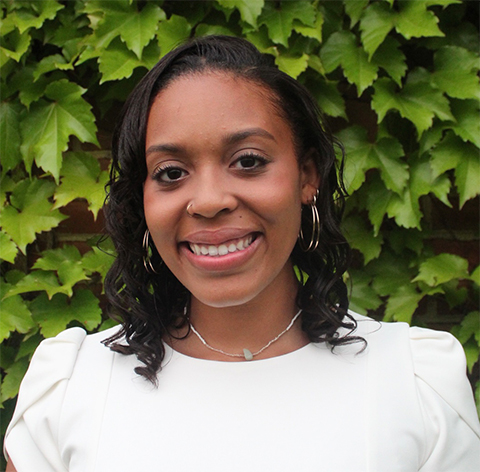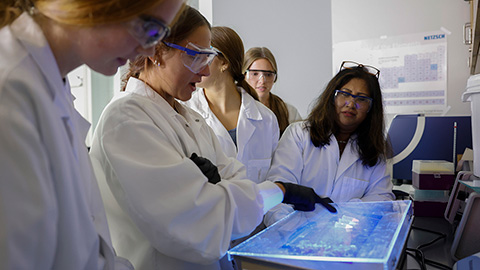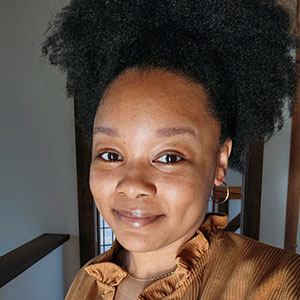A chapter builds connections
When Lauryn Ridley was applying to universities for her undergraduate studies, she looked for two things: a great science program and a supportive pre-medical program. She chose St. Mary’s College of Maryland, a national public honors college in the county where she grew up. Her conversations with pre-med advisors and biochemistry and chemistry faculty convinced her that St. Mary’s would be a good choice.
“It felt unmatched in the sense that I’m not going to get this one-on-one mentorship at some big university,” Ridley said. “It was the best decision I ever made because I had support on campus and I also had the support from my family if I needed it.”

Encouraged by her undergraduate research mentor, Pamela Mertz, Ridley became an American Society for Biochemistry and Molecular Biology Student Chapter member at St. Mary’s. The chapter was combined with the Biomolecular Organization of St. Mary’s Students, or BOSS. Ridley joined as a junior and served as president during her senior year.
St. Mary’s has only about 1,500 students, and the ASBMB chapter consisting of biochemistry, biology and chemistry students was very close-knit. They held tutoring sessions one evening a week where some students received academic help while others met with peers and casually connected. They hosted beginning of and end of semester parties with BOSS, the chemistry club and faculty from the biochemistry and chemistry department. Members also organized outreach events, including science demonstrations for elementary school students at the county fair.
Having this outlet helped Ridley build a community among her peers, she said. “It’s outside the classroom, and you can be free to relate to other people who are going through the same things that you’re going through.”
The St. Mary’s chapter faced specific challenges in recent years because post-COVID-19 student engagement was low. Ridley and other chapter members advertised the club and encouraged professors to share information with their classes, but interest in outreach activities still lagged.
“As we’ve gotten further out of that time of isolation, I think focusing on going out on campus and finding people who would like to be a part of your club is really important,” Ridley said, adding that organizers need to “find things that make your club different than what other clubs are offering.”
Ridley graduated from St. Mary’s with a bachelor’s degree in biochemistry and biology and a minor in neuroscience. She is working as a postbaccalaureate research fellow at the National Institute of Allergy and Infectious Diseases. She is a part of the Intramural Research Opportunities Program for students underrepresented in the biomedical sciences. Her lab studies hemoglobinopathies and malaria, to understand the relationship between these genetic mutations and changes within the vascular system.
“What specifically led me to sickle cell research was knowing the impact it has on minority health and wanting to contribute to research in that field,” Ridley said. “The tie-in with malaria resistance is really interesting, and that’s definitely why I pursued this lab.”
Ridley’s goal is to attend medical school following her postbaccalaureate research experience. Her own experience with having a congenital heart defect and fond memories of being treated at Walter Reed National Military Medical Center as a child inspired a special interest in pediatric cardiology. Outside of research, she exercises; she has been signing up for 5K and 10K runs, which she says helped her with the mental stressors of COVID-19, finishing her undergraduate degree and her new research position.
Enjoy reading ASBMB Today?
Become a member to receive the print edition four times a year and the digital edition monthly.
Learn moreGet the latest from ASBMB Today
Enter your email address, and we’ll send you a weekly email with recent articles, interviews and more.
Latest in Education
Education highlights or most popular articles

Summer research spotlight
The 2025 Undergraduate Research Award recipients share results and insights from their lab experiences.

Creating change in biochemistry education
Pamela Mertz will receive the ASBMB William C. Rose Award for Exemplary Contributions to Education at the ASBMB Annual Meeting, March 7-10 in Washington, D.C.

Trainee mentorship as immortality
Suzanne Barbour will receive the ASBMB Sustained Leadership Award at the ASBMB Annual Meeting, March 7-10 in Washington, D.C.

Redefining excellence to drive equity and innovation
Donita Brady will receive the ASBMB Ruth Kirschstein Award for Maximizing Access in Science at the ASBMB Annual Meeting, March 7–10, just outside of Washington, D.C.

Debugging my code and teaching with ChatGPT
AI tools like ChatGPT have changed the way an assistant professor teaches and does research. But, he asserts that real growth still comes from struggle, and educators must help students use AI wisely — as scaffolds, not shortcuts.

How AlphaFold transformed my classroom into a research lab
A high school science teacher reflects on how AI-integrated technologies help her students ponder realistic research questions with hands-on learning.

